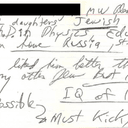
Prince William County, Virginia Courthouse
A June 2024 petition filed in the Prince William County, Virginia Circuit Court, accuses former Commonwealth Attorney (CA) Paul Ebert of withholding exculpatory evidence during the trial of Louis Jefferson Dukes Jr., who, along with his nephew Lonnie Weeks Jr., was convicted of murdering a state trooper in 1994 during a traffic stop. Mr. Dukes was found guilty and sentenced to life in prison, while Mr. Weeks was found guilty, received the death penalty, and was executed in 2000. In the petition filed with the circuit court, Mr. Dukes’ attorney alleges that CA Ebert made “material misrepresentations” in court when the prosecution claimed that serology reports established Mr. Dukes’ proximity to the state trooper when he was killed. The petition states that “the commonwealth’s attorney knew this was not the victim’s blood on [Mr. Dukes’] jacket,” despite his arguments regarding proximity. Richard MacDowell, an attorney for Mr. Dukes, alleges that CA Ebert also made a deal with Mr. Dukes’ cellmate that included a promise to seek a reduced sentence in exchange for testimony in Mr. Dukes’ case.
Throughout his more than 50 years in office, CA Ebert secured 13 death sentences, placing Prince William County, Virginia, on the list of top death penalty jurisdictions. Despite his success securing death sentences, courts have found several other instances in which CA Ebert and his office withheld exculpatory material in capital cases. In 2009, CA Ebert was criticized for withholding evidence in the case of John Allen Muhammad, but the Court decided the evidence would not have altered the trial’s outcome. Just two years later, citing evidence that CA Ebert’s office once again withheld evidence, U.S. District Judge Raymond A. Jackson overturned the capital conviction of Justin Wolfe, holding that crucial impeachment evidence was withheld from the defense. Upholding Jude Jackson’s ruling, the appeals court wrote that because of the earlier ruling in Mr. Muhammad’s case, CA Ebert’s office should “err on the side of disclosure, especially when a defendant is facing the specter of execution.”
While CA Ebert pursued the death penalty tirelessly, his success ultimately dwindled as public opinion in Virginia regarding capital punishment shifted. In 2018, CA Ebert failed to secure a death sentence in his final murder trial and told the Washington Post that Prince William County had changed since he first took office. “The demographics of Prince William were relatively conservative all those years and much more pro-death,” CA Ebert said. “And I always knew someone on the jury. Now, I seldom know someone on the jury.” CA Ebert strongly supported capital punishment and discredited the idea the life in prison without parole is worse than a death sentence. Responding to criticism regarding withholding evidence, CA Ebert said his office “always followed the law and rules of court as [he understood] them.” He added that he would “not apologize for being tough on crime.”
In 2019, CA Ebert retired and was succeeded by Amy Ashworth, who leading up to her election, said she supported the notion of repealing the death penalty but would be open to seeking the punishment as long as it was available. Ms. Ashworth told The Appeal that she did “not think the death penalty is appropriate in most cases” and that ultimately “the bottom line is the death penalty should be extraordinarily rare.” CA Ashworth won election in 2019 and just two years later, in March 2021, then-Governor Ralph Northam signed legislation formally abolishing the death penalty in Virginia.
Joan Hennessy, High-profile Virginia prosecutor accused of withholding evidence in murder case, Courthouse News Service, June 6, 2024; Liliana Segura, The Long Shadow of Virginia’s Death Penalty, The Intercept, April 11, 2021; Ian Shapira, He’s sent more killers to death row than any Va. Prosecutor. But not this time., The Washington Post, November 5, 2018.
See Mr. Dukes’ Petition to Set Aside and Vacate, here.



